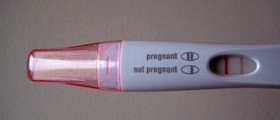
Fast, at-home, pregnancy tests can now give almost any person who's wondering whether they could be pregnant a reliable answer — at least from the day on which they were expecting menstruation. We may take them for granted now, but this quick test hasn't been around for that long. Home pregnancy tests work by detecting whether there is any hCG, which stands for human Chorionic Gonadotropin, in the urine of the person taking the test. (The "h" is lower case, because other species also produce similar hormones, which will then be preceded by a different letter.)
The hormone hCG is unique to pregnancy because it is produced by the fetal cells that will later go on to develop into the placenta. It can be detected in the urine very soon after implantation, and the levels of this hormone continue to rise dramatically in the first few weeks of pregnancy. If you are hoping to find out when you can start testing for pregnancy, you obviously want to know everything there is to know about hCG production.
The short answer to the question when hCG is produced is that it happens directly after implantation. But unfortunately, that does not mean that you are able to take a pregnancy test immediately after that, at around six to twelve days post-ovulation. Very early on in pregnancy, before a woman has missed her period, pregnancy is more easily determined through a blood test, which can also measure and detect much lower hCG levels in the body.
For most of us, waiting a little longer until we can "pee on a stick", as pregnancy tests are referred to on internet forums, is more realistic. The levels of hCG in a woman's body should continue to rise steadily until around the sixth week of pregnancy as calculated with the help of the date of her last menstrual period. It is still important to know that all home pregnancy tests are different, and have various levels of sensitivity to hCG.
You may also be curious to know that, although hCG will play a part in your pregnancy for its duration, the fact that the levels peak at about week six after conception can mean that pregnant women may not get a positive result after this time if they use cheaper pregnancy tests that only detect higher levels, and that the lines may be more faded. This does not necessarily indicate that the pregnancy is in trouble.
In general, all pregnancy tests should turn up an accurate result on the day of a missed period. Low hCG levels can indicate the start of a miscarriage and are reason for concern early on. Multiple pregnancies, on the other hand, cause a more rapid rise in hCG levels earlier on in pregnancy. Because home pregnancy tests do not give the exact levels of hCG, but just tell you whether or not they are detecting any hCG, a visit to your doctor or midwife to determine your exact levels of this hormone are the safest bet.
















Your thoughts on this
Loading...